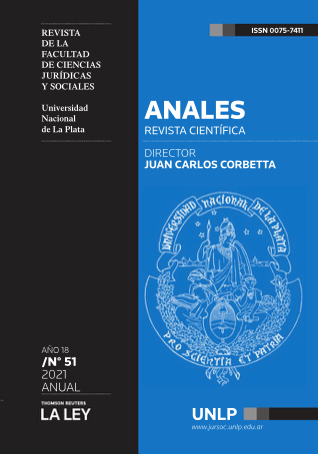The right to work in the recent inter-american jurisprudence
DOI:
https://doi.org/10.24215/25916386e083Keywords:
right to work, economic, social, cultural and environmental rights, enforceability, justiciabilityAbstract
The segmentation of human rights into civil and political rights on the one hand and economic, social and cultural rights on the other, has had a concrete impact on the way they were ranked placing some above others, something that was evident in the degrees of enforceability and justiciability. The recent jurisprudence of the Inter-American Court of Human Rights (Inter-American Court) caused a rupture in this paradigm regarding the right to work, by providing it with content and considering it an autonomous right, directly enforceable before the Inter-American system of protection. The aim of this paper is to account for the evolution of the jurisprudence of the highest regional court with regards to the right to work, systematizing the standards that emerge from the sentences. At the same time, it will seek to draw some conclusions on the reparations and challenges that are looming.
Downloads
References
bramovich, V y Courtis, C (2009). Apuntes sobre la exigibilidad judicial de los derechos sociales. En R. Gargarella (ed), Teoría y crítica del derecho constitucional, T.II, Derechos. Buenos Aires: Abeledo Perrot.
Calderón Gamboa, J. (2018). La puerta de la justiciabilidad de los derechos económicos, sociales, culturales y ambientales en el Sistema Interamericano: relevancia de la sentencia Lagos del Campo. En E. Ferrer Mac-Gregor; M. Morales Antoniazzi y R. Flores Pantoja (coord.), Inclusión, Ius commune y justiciabilidad de los DESCA en la jurisprudencia interacamericana: el caso Lagos del Campo y los nuevos desafíos (pp. 333-374). Ciudad de México: Instituto de Estudios Constitucionales del Estado de Querétaro.
Cancado Trindade, A. (1997). La justiciabilidad de los derechos económicos, sociales y culturales en el plano internacional. Revista Lecciones y Ensayos, N° 69, 70 y 71. Recuperado de http://www.derecho.uba.ar/publicaciones/lye/pub_lye_numeros_69_70_71.php
Crenshaw, K. (1991) Mapping the margins: Intersectionality, identity politics and violence against women of color. Stanford Law Review. Vol. 43. N°6 (pp. 1241-1299). Recuperado de https://www.jstor.org/stable/1229039?seq=1
Pinto, M. (2004). Los derechos económicos, sociales y culturales y su protección en el sistema universal y en el sistema interamericano. 40 Revista del IIDH (pp. 25-86). Recuperado de https://www.corteidh.or.cr/tablas/R08064-2.pdf
Saba, R. (2016). Más allá de la igualdad formal antes la ley. ¿Qué les debe el Estado a los grupos desaventajados? Buenos Aires: Siglo Veintiuno Editores.
Published
How to Cite
Issue
Section
License
Esta licencia no permite la generación de obras derivadas ni hacer un uso comercial de la obra original, es decir, sólo son posibles los usos y finalidades que no tengan carácter comercial.






























